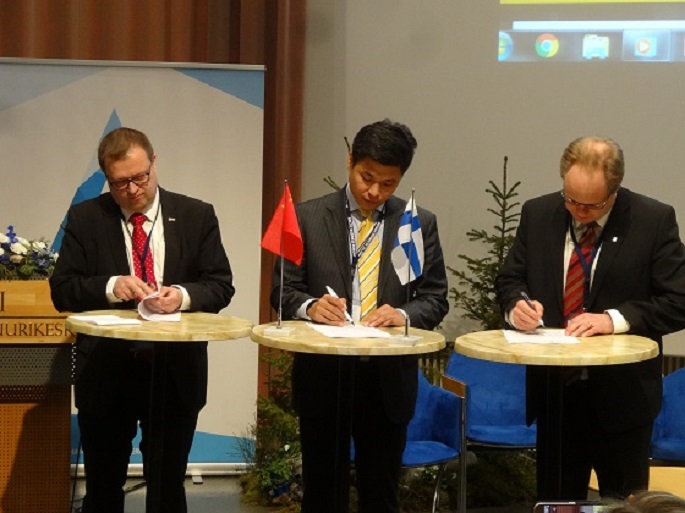9th Arctic Business Forum ends
Competitiveness seen as vital for investment
Published : 13 Apr 2018, 02:37
Updated : 13 Apr 2018, 11:22
Global competiveness of Arctic business and branding of the region as a desired investment destination took the centre stage in the second day of 9th Arctic Business Forum (ABF) in Kemi on Thursday.
“In terms of competitiveness, the location cost in Finland is high, but, on the other hand, it is the world’s happiest place,” said Newmark Global Corporate Service Vice-Chairman Robert Hess of the USA. He emphasised the importance of branding and boosting the region’s competitiveness by utilising its positive attributes such as being the happiest place in the world.
During a discussion on the importance of green economy and ensuring eco friendliness, the father and daughter duo Vaimiti Events CEO Clara Dumard and Hokulea Chief Executive Christian Dumard said they are planning to organise an ‘engine-free sea expedition along the northwest passage’ sometime in 2018 to 2020. They said the expedition planned to be carried out without using any engine fuel is aimed at raising the global awareness on sustainable use of energy.
“If successful, the expedition would attract media attention resulting in publicity of the Arctic as a region which champions a sustainable use of energy, which in its turn would bolster its competitiveness and thus entice more international investments and guests to the Arctic,” they explained.
Taking part in the discussion, International Business Machine Corporation’s (IBM) Country General Manager for Finland Mirva Antila said a key strategy for jacking up competitiveness is “ensuring technological success” and through combined efforts between humans and machines, as, she said, eventually most of the work processes would become automated.
Antila, however, warned against any illegal use of private and personal data belonging to clients while making such endeavours. She also told the session that one of the ways IBM avoids doing this is buying all the data of its clients, instead of using that unlawfully.
Tomi Seppä representing the Metsa Group said sound, efficient logistics is the key determinant of the level of competitiveness, which can also be used to improve the image and the brand of the High North as a rewarding investment point.
Seppä also underscored the high import of ensuring reliable and cost effective service provision to achieve that end.
Robert Hess from the Newmark Global Corporate Services of the USA, on the other hand, stressed the value of keeping attention on small and medium enterprises, which are seldom treated seriously, as the large companies usually enjoy the lion’s share of the focus. This, he said, is important as SMEs generate a significant number of employment opportunities and thus act as indispensible factors of furthering competiveness.
While the global trade is now in the need of tighter protectionism and increased use of bilateral agreements, the Arctic still enjoys the benefits of being a small region with open markets, pointed out Arctic Economic Council (AEC) Director Anu Fredrikson. She, however, added that, despite this advantage, “The Arctic value chains, too, need to be linked with the global value chains.”
To achieve that linkage, she said, AEC intends to open its membership to non-Arctic stakeholders in the future.
The importance of sustainability was another aspect highlighted on the concluding day of the forum. As the current tourism boom has been spelling fresh challenges for the Arctic region, speakers in the forum emphasised continued sustainable use of natural resources.
In this regard, Regional Council of Lapland Senior Tourism Adviso Satu Luiro said for the Arctic tourism industry to remain sustainable, it is necessary that tourism practices be “compatible, support wilderness and bio-diversity, and minimise waste,” among other things.
The two-day business conference ended with signing of a number of agreements between the city of Kemi, TUNGTAI International of China, DIGIPOLIS Science Park, and LAPIN AMK to implement the following projects: China-Finland cooperation in running schools; co-operation in entrepreneurial innovation education; construction of a cross-border park; and landing a service platform for scientific and creative projects.
China, being the largest trade partner of Finland in Asia for the last 15 years, TUNGTAI President Kun Shang, expressed his enthusiasm about the agreements, hoping that the two countries will strike more deals on cooperation in innovation, entrepreneurship, clean energy, bio-economy, and Arctic research in the near future.


